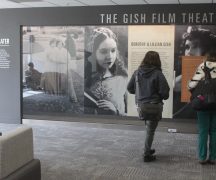What follows is the statement written by Michael Kaplan, producer of Lillian Gish’s last film “The Whales of August” and Joseph McBride, the co-writer of “The American Film Institute Salute to Lillian Gish.”
An Opportunity for Fairness and Justice at Bowling Green State University
Lillian Gish (1893-1993) is one of the greatest artists ever to grace the motion picture screen. So we were disappointed to learn that Bowling Green State University in Ohio has decided to strip Miss Gish’s name — and that of her sister, Dorothy, another prominent actress and fellow Ohio native — from its Gish Film Theater and Gallery.
Lillian Gish set the standard for nuanced, eloquent film acting in her silent-era classics Broken Blossoms, Way Down East, Orphans of the Storm, La Bohème, The Scarlet Letter, and The Wind, and she played memorable roles in many talking pictures, most notably The Night of the Hunter and The Whales of August. Her nine-decade career also encompassed landmark successes in theater, including as Ophelia to John Gielgud’s Hamlet, and television, such as in Horton Foote’s The Trip to Bountiful, about which William S. Paley declared, ”’Television came of age last night.”
Gish was a warm and caring human being who worked tirelessly to champion the causes of film preservation and film as a medium to promote universal harmony.
She established through her will in 1994 the prestigious Dorothy & Lillian Gish Prize for “a man or woman who has made an outstanding contribution to the beauty of the world and to mankind’s enjoyment and understanding of life.” Recipients have included Bob Dylan, Frank Gehry, Pete Seeger, Maya Lin, Laurie Anderson, Chile’s Isabel Allende, Nigerian author-diplomat Chinua Achebe, and African-American artists Spike Lee, Ornette Coleman, Bill T. Jones, Anna Deavere Smith, Lloyd Richards, and Suzan-Lori Parks.
When Spike Lee accepted the Gish Prize in 2013, he said, “Would you believe, two of the most important films that impacted me while I was studying at NYU starred Miss Lillian Gish. Those films were D. W. Griffith’s The Birth of a Nation and Charles Laughton’s The Night of the Hunter. Isn’t it funny (sometimes) how life works? And how ironic life can be? God can be a trickster. Peace and love to the Gish Sisters. . . .”
In 1976, Bowling Green opened The Dorothy and Lillian Gish Film Theater (the joint title was Lillian’s choice). The university accepted a gift from Lillian as part of an endowment to provide scholarships and support the theater; she also donated memorabilia to the university. Bowling Green gave her the honorary degree of Doctor of Performing Arts. But in May 2019 the university decided to remove the Gish name from the theater and call it “The BGSU Film Theater,” while retaining the endowment and Lillian’s personal memorabilia.
This action was taken because of Lillian’s supporting role in D. W. Griffith’s 1915 film The Birth of a Nation, one of more than a hundred appearances she made on the screen (it’s worth noting that Dorothy Gish didn’t even appear in that film but is simply collateral damage in this controversy). Lillian has been recognized with an American Film Institute Life Achievement Award, the Kennedy Center Honors, and an honorary Academy Award, so her legacy as a film artist remains secure. But removing her name and that of her sister from the university theater is a disservice to film history and to the university itself.
Griffith’s film takes an indefensible, racist approach to the history of the Civil War and Reconstruction. But as even the university admits in its task force report on the theater’s name, Lillian was no racist. Her work in many films, such as Griffith’s own Intolerance (1916), a dazzling four-part overview of world history in which she plays the symbolic mother figure rocking the cradle of humanity and tolerance; Griffith’s deeply moving 1919 interracial drama Broken Blossoms; the 1955 masterpiece The Night of the Hunter, in which she plays a beatific protector of endangered children; and the 1967 film of Graham Greene’s The Comedians, in which she challenges Haiti’s dreaded secret police, demonstrates her outspoken belief in universal brotherhood among races and nations.
This controversy detracts from the great legacy Gish left us in her extensive and varied career. For a university to dishonor her by singling out just one film, however offensive it is, is unfortunate and unjust. Doing so makes her a scapegoat in a broader political debate. A university should be a bastion of free speech. This is a supreme “teachable moment” if it can be handled with a more nuanced sense of history.
We call on Bowling Green State University to restore the original name of The Dorothy and Lillian Gish Film Theater. Since some inadequate language in a wall display at the theater helped provoke the university’s action, a more informative and artful display should be created to acquaint students and others with the full context of Lillian’s legacy in all its varied facets. Screening her films and holding discussions on campus about film history would foster the themes and ideals Lillian Gish advocated throughout her illustrious lifetime.
(See list of signatories below)
BGSU responds:
Bowling Green State University has a primary responsibility to serve its students, faculty, and staff, and an obligation to create an inclusive learning environment. That obligation outweighs the University’s small part in honoring the Gish sisters’ legacy.
The decision to remove the Gish name from the relocated film theater was made with the values and best interests of our community in mind, and we stand by it.
The decision was made following extensive input from students, faculty, staff, alumni and members of the public. We understood that, whatever the decision, some would be unhappy. However, we are proud of the way our community dealt with this issue – coming together to have a respectful dialogue. We believe that is what strong learning communities do.
The artistry and accomplishments of the Gish sisters are not lost on the University. The honorary degree the University awarded Lilian Gish, the scholarship in her name, and our archival collections of Gish memorabilia remain in place.
*****
Those signing An Opportunity for Fairness and Justice at Bowling Green State University are:
— Ann Louise Bardach, former contributing editor at Vanity Fair, journalist for The New York Times, The Washington Post, and Politico; author of several books on Cuba including Cuba Confidential (2002 and 2004) and Without Fidel, and Killed: Great Jou nalism: Too Hot to Print
— John Belton, film historian, author of American Cinema/American Culture, Movies and Mass Culture, and Widescreen Cinema; and professor emeritus of English and film, Rutgers University
— Robert Carringer, film historian, author of The Making of Citizen Kane and The Magnificent Ambersons: A Reconstruction; and professor of film and English
— Mike Clark, former film critic and home entertainment columnist for USA Today and former American Film Institute Theater Director/film programmer
— Jay Cocks, screenwriter of The Age of Innocence, Strange Days, Gangs of New York, and Silence; former film critic for Time
— Jon Davison, producer, Airplane!, White Dog, RoboCop and RoboCop 2, Starship Troopers
— Joe Dante, director, Gremlins, Gremlins 2: The New Batch, Matinee, The Second Civil War, Small Soldiers, Masters of Horror: “Homecoming”
— A. J. Eaton, director of David Crosby: Remember My Name
— Illeana Douglas, actress, Goodfellas, Guilty by Suspicion, To Die For, Action, Six Feet Under, Easy to Assemble; host on Turner Classic Movies
— David Ehrenstein, author of The Scorsese Picture and Open Secret: Gay Hollywood, 1928-2000, and co-author of Rock on Film; critic for many publications, including L.A. Weekly, The Los Angeles Reader, Rolling Stone,The Advocate, and the Criterion Collection
— F. X. Feeney, author of books on Orson Welles, Roman Polanski, and Michael Mann; screenwriter of Frankenstein Unbound and The Big Brass Ring; critic and journalist for
publications including L.A. Weekly, Vanity Fair, and Written By
— James E. Frasher, manager of Lillian Gish
— Anne Farley Gaines, fine artist, muralist, and independent curator; 1980 MFA Graduate in Painting from Bowling Green State University
— Tess Gallagher, poet, essayist, short story writer, and teacher; author of books including Is, Is Not: Poems, Moon Crossing Bridge, Portable Kisses, Midnight Lantern, The Lover of Horses, and The Man from Kinvara: Selected Stories
— Bruce Goldstein, director of repertory programming for New York’s Film Forum; founder, Rialto Pictures
— Shep Gordon, music manager, executive producer of The Whales of August and numerous other films, subject of Beth Aala and Mike Myers’s documentary Supermensch: The Legend of Shep Gordon
— Taylor Hackford, director, An Officer and a Gentleman, White Nights, Dolores Claiborne, Ray, Love Ranch, The Comedian, and former president of the Directors Guild of America
— Philip Hallman, film studies field librarian, Department of Screen Arts & Cultures/Hatcher Graduate Library, University of Michigan
— Mike Hodges, director, Get Carter, Pulp, The Terminal Man, Flash Gordon, Black Rainbow, I’ll Sleep When I”m Dead
— Lauren Hutton, actress and model; with films including Paper Lion, Little Fauss and Big Halsey, The Gambler, Welcome to L.A., A Wedding, American Gigolo, Hecate
— Larry Jackson, producer of Bugs Bunny Superstar and Steal Big Steal Little; former executive at Samuel Goldwyn Company, Miramax, and Orson; developer and programmer, Orson Welles Cinema
— Harlan Jacobson, film critic, WGBO Jazz 88.3, former editor-in-chief Film Comment, former staff writer at Variety and USA Today
— James Earl Jones, actor, the Star Wars films, The Great White Hope, Dr.
Strangelove, The Comedians, Claudine, Roots: The Next Generations, Paul Robeson, Field of Dreams, Jefferson in Paris, The Lion King
— Mike Kaplan, producer of The Whales of August, I’ll Sleep When I’m Dead; marketing strategist for Stanley Kubrick (2001: A Space Odyssey, A Clockwork Orange) and Robert Altman (Short Cuts), Hal Ashby; director, Luck, Trust & Ketchup and Never Apologize
— Steven Kovacs, cinema professor, San Francisco State University; former production executive for Roger Corman’s New World Pictures; and director of ’68 and Oscar-ominated producer of Arthur and Lillie
— Robert Lesser, film and theater actor, New York Shakespeare Festival and Yale Repertory, in such films as David Holzman’s Diary, Hester Street, Die Hard, and Best Wishes for Tomorrow
— Rod Lurie, writer-director, The Contender, Nothing But the Truth, Straw Dogs, Killing Reagan, and The Outpost; creator of TV series Commander in Chief
— Joseph McBride, biographer of John Ford, Frank Capra, and Steven Spielberg; author of three books on Orson Welles; co-writer, The American Film Institute Salute to Lillian Gish; professor of cinema at San Francisco State University
— Malcolm McDowell, actor, If . . ., A Clockwork Orange, O Lucky Man!, Time After Time, The Company, Evilenko, Star Trek Generations, Never Apologize, and the TV se-
ries Mozart in the Jungle
— Joe McElhaney, author of The Death of Classical Cinema: Hitchcock, Lang, Minnelli and Albert Maysles; and film professor, Hunter College
— Douglas McGrath, screenwriter of Bullets over Broadway; director of Emma and Infamous; and political commentator for The New Republic
— Patrick McGilligan, biographer of Alfred Hitchcock, Robert Altman, George Cukor, Oscar Micheaux, Clint Eastwood, and Mel Brooks
— Russell Merritt, film historian and adjunct professor of film, University of California, Berkeley; former film professor, University of Wisconsin, Madison; author of numerous critical studies of D. W. Griffith and co-author of Walt in Wonderland: The Silent Films of Walt Disney and Walt Disney’s Silly Symphonies
— Dame Helen Mirren, actress, The Queen, O Lucky Man!, Hamlet, Excalibur, The Madness of King George, Some Mother’s Son, Gosford Park, The Last Station, Trumbo, and the TV series Prime Suspect and Elizabeth I
— James Naremore, film historian of books on Orson Welles, Stanley Kubrick, film noir, and Charles Burnett; and chancellors’ professor emeritus, Media School, English, and Comparative Literature, Indiana University
— Joanna Ney, co-curator, Dance on Camera Festival; former curator, Special Projects, The Film Society of Lincoln Center
— Carolyn Pfeiffer, producer, Alice Cooper: Welcome to My Nightmare, Choose Me, The Whales of August, The Moderns, Children of Giant
— David W. Rintels, screenwriter of Clarence Darrow (adapted from his Broadway play), Fear on Trial, Gideon’s Trumpet, Andersonville, and Nuremberg; former president of Writers Guild of America, West; winner of the WGA Paddy Chayefsky Laurel Award for Television
— Victoria Riskin, screenwriter-producer of My Ántonia; former president of Writers Guild of America, West; activist in Human Rights Watch; First Amendment Award winner from American Civil Liberties Union; author of Fay Wray and Robert Riskin: A Hollywood Memoir
— Howard A. Rodman, screenwriter and novelist; films, Joe Gould’s Secret, Takedown, Savage Grace, August; author, Destiny Express and The Great Eastern; former president of Writers Guild of America, West; professor and former chair of the writing division at the University of Southern California School of Cinematic Arts
— Carl Rollyson, biographer of Susan Sontag, Rebecca West, Marilyn Monroe, Walter Brennan, William Faulkner, and Sylvia Plath
— Annie Ross, singer and actress; member of the jazz vocal trio Lambert, Hendricks & Ross; actress in Pump Up the Volume, Short Cuts, and The Player and onstage in Side by Side by Sondheim and The Pirates of Penzance
— Jonathan Rosenbaum, author of Discovering Orson Welles, Moving Places, Movies as Politics, Movie Wars, and Goodbye Cinema, Hello Cinephilia; former film critic for The Chicago Reader and now freelance critic for numerous international publications
— Alan Rudolph, director, Welcome to L.A., Remember My Name, The Moderns, Mrs. Parker and the Vicious Circle, Breakfast of Champions, Ray and Helen`
— Martin Scorsese, director, Mean Streets, Italianamerican, Taxi Driver, Raging Bull, The King of Comedy, The Last Temptation of Christ, Goodfellas, The Blues: “Feel Like Going Home,” The Departed, Hugo, Silence, Rolling Thunder Revue, The Irishman
— Anthony Slide, film historian, author of more than seventy books and editor of 150 more; with books including Early American Cinema, Early Women Directors, The Silent Feminists, and Lois Weber: The Director Who Lost Her Way in History; co-director of the documentary The Silent Feminists: America’s First Women Directors
— George Stevens, Jr., producer (including of The American Film Institute Salute to Lillian Gish); former director of the Motion Picture Service of the United States Information Agency; founder of American Film Institute; former producer of the Kennedy Center Honors
— Kevin Stoehr, film historian, author of Ride, Boldly Ride: History of the American Western Movie and co-editor of John Ford in Focus; and associate professor of Humanities, Boston University
— Bertrand Tavernier, director of The Clockmaker of St. Paul, The Judge and the Assassin, Mississippi Blues, ’Round Midnight, and A Journey Through French Cinema; co-author of Fifty Years of American Cinema and author of American Friends: Interviews with the Great Auteurs of Hollywood
— Laura Truffaut, French translator and tutor; human rights activist; actress and crew member, Small Change; daughter of director François Truffaut and co-administrator of his estate
— Robert B. Weide, director of Curb Your Enthusiasm and documentaries on Lenny Bruce, Mort Sahl, the Marx Bros., Kurt Vonnegut, and Woody Allen
— Armond White, film critic for National Review and Out; former critic for New York Press; author of Rebel for the Hell of It: The Life of Tupac Shakur and New Position: The Prince Chronicles
— Tony Williams, film historian, author of books on Vietnam War films, horror films, Italian Westerns, Jack London, Robert Aldrich, and Larry Cohen; and professor of English and area head of Film Studies, Southern Illinois University




